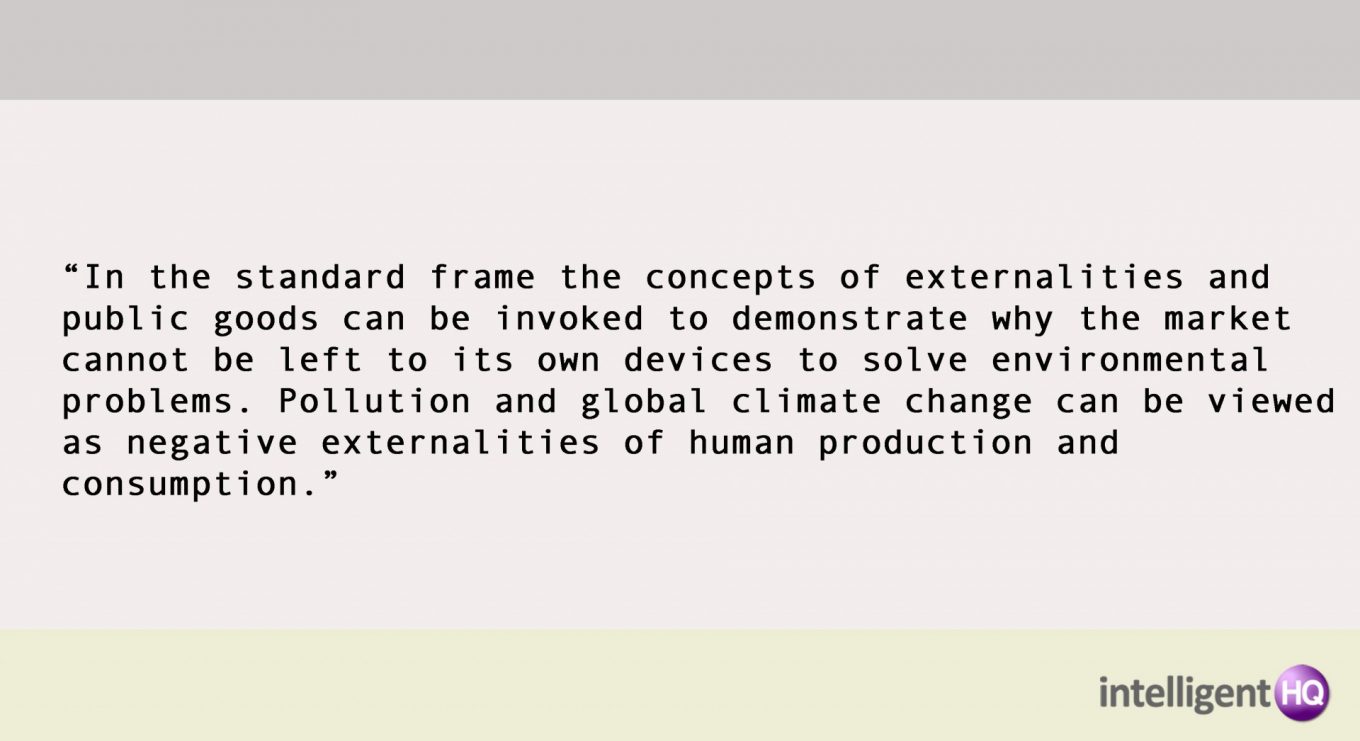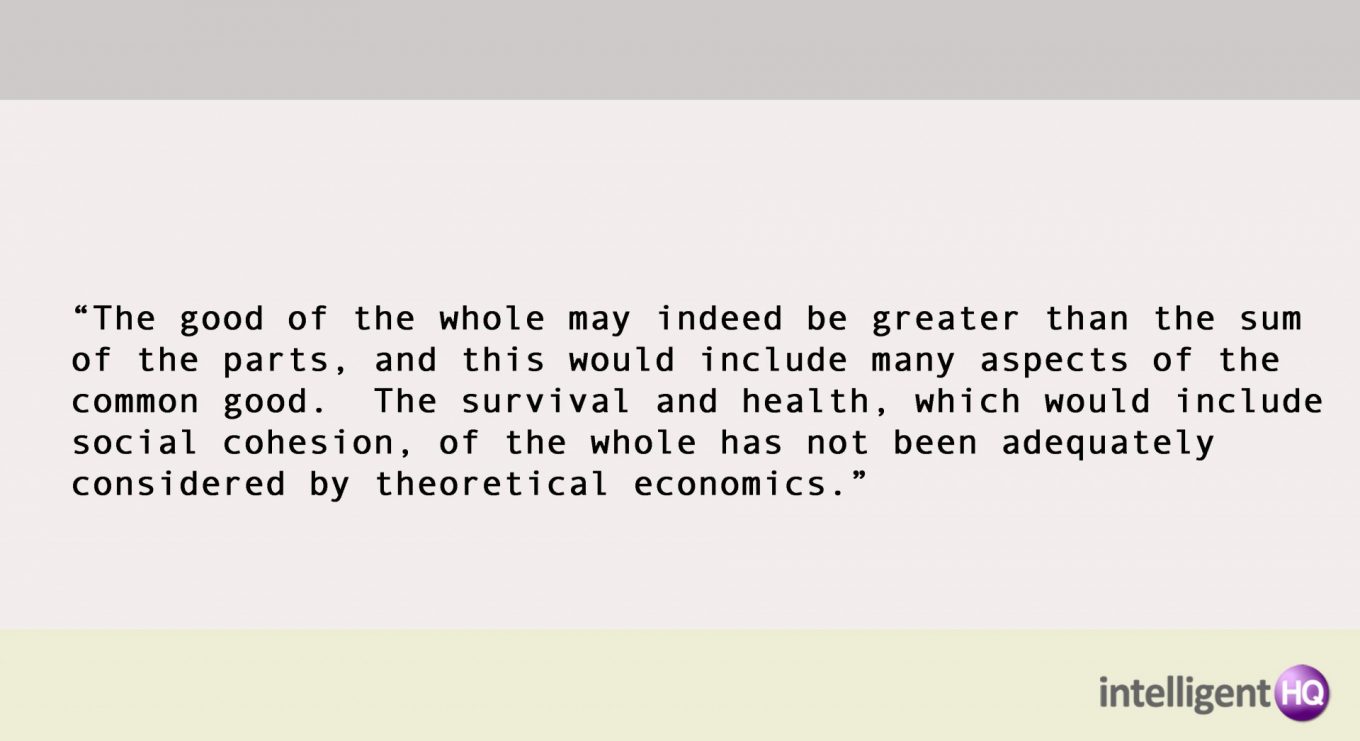
The case for Ecology in the standard frame:
The case for Ecology is quite easy to make in the standard frame. Human beings derive tremendous benefits from the environment in which they live. Destruction of the environment not only impoverishes current and future generations, it also threatens the continued existence of the human species, not to mention countless other species as well. There are many benefits that humans derive from the environment and a healthy ecology.
First and foremost our environment sustains our very lives and a healthy environment is conducive to human health.
Pollution and global climate change adversely impacts health, happiness and utility. Losses in health and life expectancy sap labor productivity and morale, even as medical bills, relocation and other costs increase. Other species which are imperiled by pollution and climate change also provide benefits to people in terms of food, medicines, resources, photo, audio, research, and vacation opportunities. As other species decline in numbers human happiness will be adversely impacted. Also as technology increases as well as knowledge and scientific methods, a species gone extinct today may well deprive us of countless future benefits we would have otherwise enjoyed.
Theoretically all of the intangible benefits to people of clean air, clean water, healthy ecosystems, and bio-diversity could be included in our models. We could include the scent and visual appeal of clean air. We could include the benefit of just knowing that some wilderness remains, that so many other species are not going extinct, of seeing and experiencing the joys of wilderness and as much of the natural world that remains, but that is not typically done in practice. But theoretically all of these intangible benefits and costs could be incorporated into the model.
In the standard frame the concepts of externalities and public goods can be invoked to demonstrate why the market cannot be left to its own devices to solve environmental problems. Pollution and global climate change can be viewed as negative externalities of human production and consumption. In which case the production and consumption that is the cause of the problem could either be taxed or regulated so as to lessen or eliminate the source of pollution or climate change.

Either way standard theory aptly demonstrates the need for some type of collective action. The market will not solve the problem on its own. Conversely clean air, healthy ecosystems, natural climates, can be viewed as public goods. Basic economics clearly shows that markets cannot provide an adequate amount of any public good and that therefore government must act to insure such provision.
Just as future generations of individual human persons do not get to vote in our markets nor in our policy debates, other species also do not get to vote in our markets or our debates. While cost benefit analysis does typically consider the benefits and costs to future generations, apart from the value that the current generation places on future generations, even though at too high a rate of discount, the benefit and costs experienced by other species of animals and plants are not considered at all.
Unfortunately the standard model values other species according to their benefit to people. Theoretical economics could value other species, apart and in addition to their benefit to people but that is not what is typically done in practice.
Theoretical Economics verses Economics in Practice
Standard theory can through the use of public goods and externalities make the case for greater equality, a cleaner environment, and sustainability. Yet even though standard theory can make such a case, it is not typically done on a practical policy level. Incorporating the value of other species to itself is rarely seen even in academic papers. Even the benefits that individuals derive from living in a more just and equal society are rarely considered in policy circles and even academic conferences. Theoretical economics can easily make the case for equality, ecology, and sustainability, but all too infrequently makes such an engagement.
Some holes in Economic Theory
The Whole verses the Sum of the Parts & Rationality, Really
Where theory itself falls short is in considering the whole to be greater than the sum of the parts. Standard Social Welfare Theory merely adds or sums the net benefit to individuals to obtain the net benefit to society. But the good of the whole may indeed be greater than the sum of the parts, and this would include many aspects of the common good. The survival and health, which would include social cohesion, of the whole has not been adequately considered by theoretical economics. The Whole could be community or town, Nation, Human Species, or even the Eco-System. Theoretical Economics gives inadequate attention to even recognition of the Whole, let alone the good of the Whole, or the Common Good.

There is a good of the Whole that the market cannot and does not consider. Individuals may well benefit from the good of the Whole, the good of the group. Individuals may even be well aware of these benefits. When standard economics fails to adequately recognize the existence of the group, of the whole, the benefit of the groups existence or health to individuals, the benefits they are aware of, when they reflect upon the situation, can easily be overlooked in the theoretical model. These are not direct separable benefits to individuals and can easily be missed by an economic science which uses the individual and the sum of individuals as the alpha and omega of its analysis. Even if the theoretical model succeeded in somehow counting these, such benefits would be in the nature of a public good, a good therefore that markets and competition will not supply in an ample amount. Count not therefore on free trade protecting a town or a community.
There are other benefits which accrue to individuals as a result of the Whole’s survival and health of which those individuals are only faintly aware of or perhaps not at all, even after great reflection. And then there may be benefits from the survival or health of the group that exceeds these indirect benefits to individuals.
Standard theory also implicitly if not explicitly assumes that people correctly perceive their costs and benefits, that they know the true usefulness of actions and objects. In standard economics it is known as the rationality postulate. In an age of every more sophisticated and subtle forms of manipulation of tastes and preferences through advertising, mass marketing, and media, it is doubtful that individuals know their true benefits and costs, if they ever did.
Yet no matter how well the benefits to the Whole are considered, no matter how broadly and completely the benefit and costs to individuals of the present and even future generations are counted, or even to other species, this is still essentially a Utilitarian calculation. It is still an ethic of usefulness that guides and serves as the foundation. Something more is needed.
For The Sake of The Common Good: Breaking the Boundaries of Rational Calculation Part 1
Dr. Steve Szeghi is Professor of Economics at Wilmington College, Ohio, USA. At various times Professor Szeghi has been Department Head and Area Coordinator for Accounting, Business Administration and Economics. In 2009 Steve Szeghi co-authored, with Peter Brown, Geoffrey Garver, Keith Helmuth, and Robert Howell, Right Relationship: Building a Whole Earth Economy. In 05-06 Szeghi’s article, Lessons in Sustainable Development on the Navajo Nation, appeared in the Journal for Economics and Politics. He has been the author of many articles on social justice, environmental economics, primers in economics for social activists, and the economies of indigenous and aboriginal peoples as alternative economic systems, in numerous on-line journals such as Journal of Globalization for the Common Good Initiative, Global Media Journal, Common Dreams, and Share the World’s Resources, as well as printed journals such as Kosmos.
Professor Szeghi writes as well on the spiritual values and ethical aspects of social justice, equality, and ecology as pertaining to the economy and economic ways of thinking. He has had in recent years numerous international engagements as a speaker and presenter focusing on these topics at conferences and forums throughout the world. Starting at the age of 15, Steve Szeghi began working ardently for social justice doing substantial work with the United Farm Workers Union (Cesar Chavez) until his mid-twenties. Steve Szeghi continues to work for social justice, equality, and the environment; working with or consulting for on a pro-bono basis in recent years, environmental and labor organizations, candidates for political office who demonstrate a commitment to social justice and ecology, as well as indigenous groups and tribal governments.






























